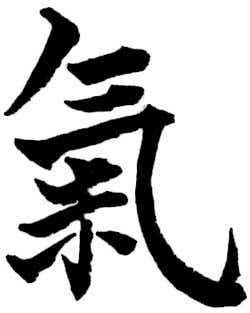Talk:Qi
Qi (or ch'i) is understood to be an energetic force permeating the totality of existence, and an essential component to all living beings. It has cognates in several cultures, such as Prana in the Vedic faiths, and pneuma in the Greco-Roman mystery religions, including Hermeticism. In Taoism, it is one of "Three Treasures," the others being shen and jing.
Applications
Chinese Medicine
A great deal of Chinese medicine involves streamlining the body's qi flow through various methods. The background of Chinese medical theory is that many illnesses, both physical and mental, are caused by an inefficient or obstructed flow of qi in the individual. This is remedied through several means, including herbal therapy, special breathing and physical exercises, and acupuncture.
Acupuncture
It is believed that there exist main qi pathways in the body, called "meridians." The central idea of acupuncture is to use very fine needles to stimulate these areas of the body, in order to free up blockages of qi, or encourage qi to travel towards that meridian.
Feng Shui
Following the ideas of qi being essentially everywhere, and the necessity or efficient flowing of qi in the body, Feng Shui is the practice of arranging physical objects for better chi flow throughout one's own space. It is determined by a multitude of factors, and is considered to be a complicated science in heavily Taoist communities.
Cultivation
Qigong
Qigong is a form of exercise and meditation, which is composed primarily of various breathing techniques, combined with slow, flowing movements. In Western culture, it is often confused for t'ai chi. It is a very popular activity, renowned in China for its health benefits and its calming effects to quiet the mind.
T'ai Chi
Originally conceived as a defensive martial art, it has evolved and branched into different focuses, including exercise, meditation, and a form of internal alchemy.
